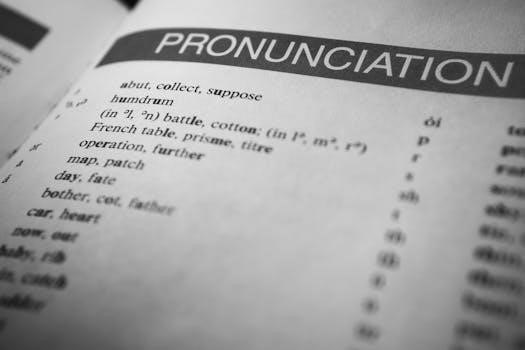Effective Study Strategies for Biology Finals
To ace your biology finals, employ effective strategies such as repetition and active recall․ Quiz yourself often on the material and link information to real-life examples to enhance understanding․ Consistent study is crucial; create a study schedule to manage the material efficiently․
Repetition and Active Recall
The cornerstone of effective learning for biology finals lies in the power of repetition and active recall․ Consistent revisiting of the material is crucial for solidifying concepts in your memory․ Instead of passively rereading notes, actively engage with the information by quizzing yourself․ This active recall method forces your brain to retrieve the information, strengthening neural pathways and improving retention․ Regular self-testing, using flashcards or practice questions, is far more effective than simply reviewing notes․ The more frequently you challenge yourself to recall information, the better you will understand and remember it․ This proactive approach will ensure that knowledge isn’t just passively absorbed, but is actively embedded in your long-term memory․ Effective repetition and recall techniques are not about cramming, but about consistent engagement with the study material․ This is the most fundamental strategy to make sure you are ready for your biology finals․
Linking Information to Real-Life Examples
To truly grasp complex biological concepts, it’s vital to connect them to real-world scenarios․ Abstract ideas often become clearer when you can see their practical applications․ For instance, when learning about osmosis, think of how water moves in and out of cells, like a cell swelling in a hypotonic solution․ This creates a memorable image of a “hippo” cell․ Relating cellular processes to everyday occurrences, such as how a plant uses photosynthesis, makes the information stick better․ This method transforms theoretical knowledge into something more tangible and relatable․ When you can visualize how a biological process works in a natural context, it enhances comprehension and recall․ Make a conscious effort to identify real-life examples for each concept you learn․ This approach not only helps in remembering the facts but also deepens your understanding of the underlying biological principles, making your study more effective and engaging․ This will help you approach your final with confidence․
Importance of Consistent Study Schedule
Establishing a consistent study schedule is paramount for conquering the vast amount of material in biology; The subject matter tends to build quickly, and falling behind can make the material feel overwhelming․ A well-structured plan can help you divide the information into manageable sections, preventing last-minute cramming sessions․ Using a planner to record important dates, such as assignment deadlines and test dates, will keep you organized and on track․ By allocating specific time slots for studying, you create a routine that promotes consistent progress, allowing you to build a strong base of knowledge incrementally․ Consistency also helps reinforce learning, as regular revisiting of concepts strengthens retention and allows for a deeper understanding․ A structured schedule will reduce stress and make studying less daunting․ It transforms the studying process from a reactive approach to a proactive one, contributing significantly to your overall success in your biology course․ Avoid studying at the last minute․

Key Components of a Biology Study Guide
A biology study guide should focus on identifying and addressing your weakest areas․ Utilize lesson objectives and available resources, like textbooks and notes․ Prioritize understanding concepts rather than rote memorization for effective learning․

Focusing on Weakest Areas
When preparing for your biology final, it’s crucial to identify and prioritize your weakest areas․ Don’t waste precious time on topics you already understand well․ Instead, dedicate your study sessions to those concepts that consistently confuse you or where you have made mistakes on practice quizzes․ Begin by reviewing past quizzes, homework assignments, and lecture notes to pinpoint specific topics or concepts that you struggled with․ Once you have identified these areas, allocate extra time and effort to review, practice, and seek clarification․ Consider using different study methods, such as re-explaining the concept to yourself in simple terms, or using visual aids like diagrams or mind maps to break down difficult ideas․ Utilize resources such as textbooks, online materials, and study guides to reinforce your understanding․ If you’re still struggling, don’t hesitate to ask your teacher or classmates for help․ It’s better to address your weak spots now rather than hoping they will go away by exam time․ By focusing on your weaknesses, you will feel more confident and prepared․ This targeted approach will also maximize your study time and improve your performance․
Utilizing Lesson Objectives and Resources
Effective preparation for your biology final exam involves actively utilizing all available resources․ Begin by carefully reviewing the lesson objectives provided by your instructor for each module or chapter․ These objectives outline the key concepts and skills you are expected to master․ Use them as a checklist to ensure you have a thorough understanding of each topic․ Additionally, make the most of your course resources, such as textbooks, lecture notes, PowerPoint slides, and online materials․ These resources contain valuable information, examples, and explanations that can enhance your understanding․ Pay close attention to guided reading questions, practice exams, and any work assigned in class, as they are often aligned with the exam content․ Reviewing your work on assignments and mastering biology activities is also crucial․ Don’t limit yourself to passive reading․ Actively engage with the materials by summarizing key points, creating flashcards, or drawing diagrams․ By taking full advantage of all available resources and lesson objectives, you can create a strong foundation for success on your biology final exam․ Remember, these resources are designed to help you learn and understand the material effectively․

Understanding Concepts over Memorization
When preparing for a biology final, it’s vital to prioritize understanding concepts over rote memorization․ Instead of merely trying to remember definitions and facts, focus on grasping the underlying principles and relationships within the biological systems․ This approach will help you connect different ideas and see how they fit together, rather than seeing them as isolated pieces of information․ Avoid passively reading your notes or textbooks; instead, challenge yourself to explain the concepts in your own words․ When learning new material, break down complex ideas into simpler parts and work to understand each part thoroughly before integrating it with other concepts․ Use real-world examples or analogies to help clarify difficult topics․ For instance, if you are learning about buffers, don’t just memorize their definition, understand how they function in the bicarbonate buffer system and how they maintain cellular pH․ Focus on the “why” and the “how” behind each concept․ This approach will deepen your understanding and improve your ability to apply your knowledge to unfamiliar situations, which is crucial for exam success․ Remember, learning is an active process, and understanding concepts is more valuable than simply memorizing isolated facts․

Practical Study Techniques
Enhance your study sessions by creating mind maps and using flashcards for memorization․ Take regular breaks to avoid burnout and complete practice quizzes and exams to test your knowledge․ These techniques will improve your understanding․
Creating Mind Maps and Concept Maps
Mind maps and concept maps are powerful visual tools that can significantly enhance your understanding of complex biological concepts․ These techniques help you organize information in a non-linear way, allowing you to see the connections between different ideas․ Start by placing the main topic in the center and then branch out with related concepts․ Use different colors and images to make the map more engaging and memorable․ This method encourages active learning, as you actively think about how different concepts relate to each other․ When creating these maps, it’s important to focus on understanding the relationships rather than simply memorizing facts․ By visualizing the entire topic, you gain a holistic view of the subject matter, making it easier to recall and apply your knowledge․ This approach also helps in identifying gaps in your understanding, thus guiding your further studies․ Utilize mind maps to revise efficiently and to build a comprehensive knowledge structure․ They are excellent for quick reviews and for solidifying your understanding․
Using Flashcards for Memorization
Flashcards are an invaluable tool for memorizing key terms, definitions, and processes in biology․ Create flashcards with terms on one side and definitions or explanations on the other․ Focus on the fundamental terms and concepts that you struggle with․ Regularly review these flashcards, making sure to shuffle them each time to avoid memorizing the order․ Use active recall – try to remember the answer before flipping the card․ This technique strengthens memory and helps identify weak areas․ It is better to focus on understanding the concept and then use the flashcards to test your understanding․ Keep flashcards handy to maximize study time․ Divide flashcards into topics to focus on specific areas․ Flashcards can also be useful for studying with friends or in groups․ This method will enable you to remember terms, processes, and diagrams effectively․ Flashcards help in quick revision․ It is a convenient and easy way to study․
Taking Regular Breaks to Avoid Burnout
Studying for biology finals requires intense focus, but it’s vital to take regular breaks to prevent burnout and enhance learning․ Avoid extended study sessions without breaks; they can lead to reduced concentration and retention․ Incorporate short breaks, such as 5-10 minutes, every hour or so․ During breaks, move around, stretch, or do some other activity that isn’t related to your studies․ This helps refresh your mind and body․ Engage in activities you enjoy during breaks to keep you motivated․ Avoid screen time during breaks if possible, to give your eyes a rest․ Regular breaks help prevent mental fatigue․ They also improve focus and memory․ Breaks allow your brain to process information effectively․ Plan your study schedule with short breaks so that you don’t get overwhelmed․ These small breaks contribute to a more efficient and sustainable study routine․ Taking regular breaks is a key aspect of effective studying․
Practice Quizzes and Exams
One of the most effective ways to prepare for biology finals is by using practice quizzes and exams․ These tools are essential for assessing your understanding and identifying areas that need more attention․ Taking practice quizzes helps you become familiar with the exam format․ They help you get comfortable with the types of questions you will see on the real test․ Using practice exams allows you to simulate the actual testing conditions․ They help you manage your time effectively․ Review your performance on practice quizzes and tests․ Focus on the areas where you made mistakes․ Use these results to guide your further study․ Focus on the topics you did not understand․ Regular practice is key to improving retention and confidence․ Try to find previous tests from your teacher․ Complete practice exams under timed conditions to simulate real exam pressure․ Practice quizzes and exams are very important for final exam preparation․ They can improve your overall performance․


